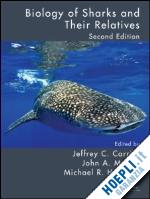Phylogeny and ZoogeographyThe Origin and Relationships of Early ChondrichthyansEileen D. Grogan, Richard Lund, and Emily Greenfest-AllenElasmobranch Phylogeny: A Mitochondrial Estimate Based on 595 SpeciesGavin J.P. Naylor, Janine N. Caira, Kirsten Jensen, Kerri A.M. Rosana, Nicolas Straube, and Clemens LaknerPhylogeny of BatoideaNeil C. Aschliman, Kerin M. Claeson, and John D. McEachranPhylogeny, Biology, and Classification of Extant HolocephalansDominique A. Didier, Jenny M. Kemper, and David A. EbertForm, Function, and Physiological ProcessesBiomechanics of Locomotion in Sharks, Rays, and ChimerasAnabela M.R. Maia, Cheryl A.D. Wilga, and George V. LauderPrey Capture Behavior and Feeding Mechanics of ElasmobranchsPhilip J. Motta and Daniel R. HuberEnergetics, Metabolism, and Endothermy in Sharks and RaysDiego Bernal, John K. Carlson, Kenneth J. Goldman, and Christopher G. LoweFood Consumption and Feeding HabitsBradley M. Wetherbee, Enric Cortés, and Joseph J. BizzarroIntegrative Multisensor Tagging: Emerging Techniques to Link Elasmobranch Behavior, Physiology, and EcologyNicholas M. Whitney, Yannis P. Papastamatiou, Adrian C. GleissReproductive Biology of ElasmobranchsChristina L. Conrath and John A. MusickHormonal Regulation of Elasmobranch PhysiologyJames Gelsleichter and Andrew N. EvansSensory Physiology and Behavior of ElasmobranchsJayne M. Gardiner, Robert E. Hueter, Karen P. Maruska, Joseph A. Sisneros, Brandon M. Casper, David A. Mann, Leo S. DemskiRecent Advances in Elasmobranch ImmunologyCarl A. Luer, Catherine J. Walsh, and Ashby B. Bodine Ecology and Life HistoryAssessing the Age and Growth of Chondrichthyan FishesKenneth J. Goldman, Gregor M. Cailliet, Allen H. Andrews, and Lisa J. NatansonPopulation Dynamics, Demography, and Stock AssessmentEnric Cortés, Elizabeth N. Brooks, and Todd GedamkeGenetics of Sharks, Skates, and RaysEdward J. HeistPredator–Prey InteractionsMichael R. Heithaus and Jeremy J. VaudoAn Updated Look at Elasmobranchs as Hosts of Metazoan ParasitesJanine N. Caira, Claire J. Healy, and Kirsten JensenAssessing Habitat Use and MovementColin A. Simpfendorfer and Michelle R. HeupelIndex











